Events
| | This section needs expansion. You can help by adding to it. (October 2015) |
| Years in Russia: | 1812 1813 1814 1815 1816 1817 1818 |
| Centuries: | 18th century · 19th century · 20th century |
| Decades: | 1780s 1790s 1800s 1810s 1820s 1830s 1840s |
| Years: | 1812 1813 1814 1815 1816 1817 1818 |
Events from the year 1815 in Russia
| | This section needs expansion. You can help by adding to it. (October 2015) |
| | This section needs expansion. You can help by adding to it. (October 2015) |
| | This section needs expansion. You can help by adding to it. (October 2015) |
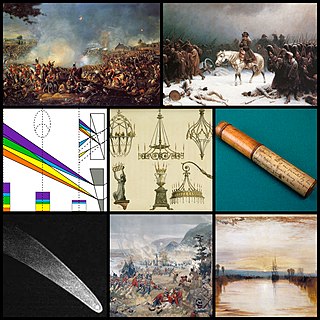
The 1810s was a decade of the Gregorian calendar that began on January 1, 1810, and ended on December 31, 1819.
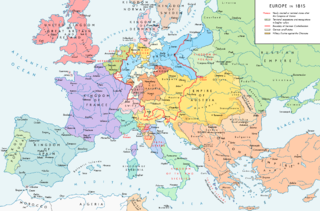
The Congress of Vienna of 1814–1815 was a series of international diplomatic meetings to discuss and agree upon a possible new layout of the European political and constitutional order after the downfall of the French Emperor Napoleon Bonaparte. Participants were representatives of all European powers and other stakeholders. The Congress was chaired by Austrian statesman Klemens von Metternich, and was held in Vienna from September 1814 to June 1815.

The Napoleonic Wars (1803–1815) were a series of conflicts fought between the First French Empire under Napoleon (1804–1815) and a fluctuating array of European coalitions. The wars originated in political forces arising from the French Revolution (1789–1799) and from the French Revolutionary Wars (1792–1802), and produced a period of French domination over Continental Europe. The wars are categorised as seven conflicts, five named after the coalitions that fought Napoleon, plus two named for their respective theatres; the War of the Third Coalition, War of the Fourth Coalition, War of the Fifth Coalition, War of the Sixth Coalition, War of the Seventh Coalition, the Peninsular War, and the French invasion of Russia.

Frederick Augustus I was a member of the House of Wettin who reigned as the last Elector of Saxony from 1763 to 1806 and as the first King of Saxony from 1806 to 1827. He was also Duke of Warsaw from 1807 to 1815, and a legitimate candidate to the Polish throne.

The Treaty of Paris of 1815, also known as the Second Treaty of Paris, was signed on 20 November 1815, after the defeat and the second abdication of Napoleon Bonaparte. In February, Napoleon had escaped from his exile on Elba, entered Paris on 20 March and began the Hundred Days of his restored rule. After France's defeat at the hands of the Seventh Coalition at the Battle of Waterloo, Napoleon was persuaded to abdicate again, on 22 June. King Louis XVIII, who had fled the country when Napoleon arrived in Paris, took the throne for a second time on 8 July.

The Hundred Days, also known as the War of the Seventh Coalition, marked the period between Napoleon's return from eleven months of exile on the island of Elba to Paris on 20 March 1815 and the second restoration of King Louis XVIII on 8 July 1815. This period saw the War of the Seventh Coalition, and includes the Waterloo Campaign and the Neapolitan War as well as several other minor campaigns. The phrase les Cent Jours was first used by the prefect of Paris, Gaspard, comte de Chabrol, in his speech welcoming the king back to Paris on 8 July.
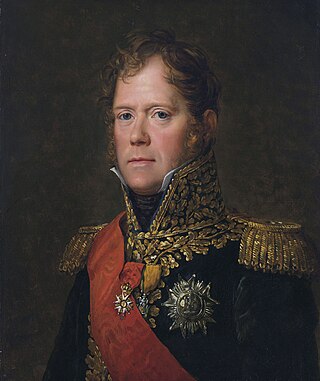
Michel Ney, 1st Prince de la Moskowa, 1st Duke of Elchingen was a French military commander and Marshal of the Empire who fought in the French Revolutionary Wars and the Napoleonic Wars.

The Napoleonic era is a period in the history of France and Europe. It is generally classified as including the fourth and final stage of the French Revolution, the first being the National Assembly, the second being the Legislative Assembly, and the third being the Directory. The Napoleonic era begins roughly with Napoleon Bonaparte's coup d'état, overthrowing the Directory, establishing the French Consulate, and ends during the Hundred Days and his defeat at the Battle of Waterloo. The Congress of Vienna soon set out to restore Europe to pre-French Revolution days. Napoleon brought political stability to a land torn by revolution and war. He made peace with the Roman Catholic Church and reversed the most radical religious policies of the Convention. In 1804 Napoleon promulgated the Civil Code, a revised body of civil law, which also helped stabilize French society. The Civil Code affirmed the political and legal equality of all adult men and established a merit-based society in which individuals advanced in education and employment because of talent rather than birth or social standing. The Civil Code confirmed many of the moderate revolutionary policies of the National Assembly but retracted measures passed by the more radical Convention. The code restored patriarchal authority in the family, for example, by making women and children subservient to male heads of households.

The Austrian Empire, officially known as the Empire of Austria, was a multinational European great power from 1804 to 1867, created by proclamation out of the realms of the Habsburgs. During its existence, it was the third most populous monarchy in Europe after the Russian Empire and the United Kingdom. Along with Prussia, it was one of the two major powers of the German Confederation. Geographically, it was the third-largest empire in Europe after the Russian Empire and the First French Empire.

Joachim Murat was a French military commander and statesman who served during the French Revolutionary Wars and Napoleonic Wars. Under the French Empire he received the military titles of Marshal of the Empire and Admiral of France. He was the first Prince Murat, Grand Duke of Berg from 1806 to 1808, and King of Naples as Joachim-Napoleon from 1808 to 1815.

Congress Poland, Congress Kingdom of Poland, or Russian Poland, formally known as the Kingdom of Poland, was a polity created in 1815 by the Congress of Vienna as a semi-autonomous Polish state, a successor to Napoleon's Duchy of Warsaw. It was established when the French ceded a part of Polish territory to the Russian Empire following France's defeat in the Napoleonic Wars. In 1915, during World War I, it was replaced by the German-controlled nominal Regency Kingdom until Poland regained independence in 1918.

The Free, Independent, and Strictly Neutral City of Cracow with its Territory, more commonly known as the Free City of Cracow, and the Republic of Cracow, was a city republic created by the Congress of Vienna in 1815, which included the Polish city of Cracow and its surrounding areas.

The casualties of the Napoleonic Wars (1803–1815), direct and indirect, are broken down below:
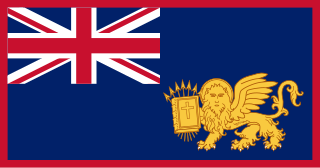
The United States of the Ionian Islands was a Greek state and amical protectorate of the United Kingdom between 1815 and 1864. The successor state of the Septinsular Republic, it covered the territory of the Ionian Islands, as well as the town of Parga on the adjacent mainland in modern Greece. It was ceded by the British to Greece as a gift to the newly enthroned King George I, apart from Parga, which had been sold to Ali Pasha of Ioannina in 1819.
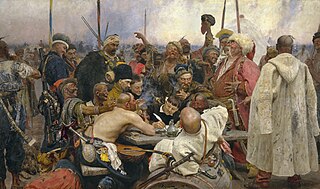
Siberian Cossacks were Cossacks who settled in the Siberian region of Russia from the end of the 16th century, following Yermak Timofeyevich's conquest of Siberia. In early periods, practically the whole Russian population in Siberia, especially the serving-men, were called Cossacks, but only in the loose sense of being neither land-owners nor peasants. Most of these people came from northwest Russia and had little connection to the Don Cossacks or Zaporozhian Cossacks.

The First French Empire, officially the French Republic, then the French Empire after 1809 and also known as Napoleonic France, was the empire ruled by Napoleon Bonaparte, who established French hegemony over much of continental Europe at the beginning of the 19th century. It lasted from 18 May 1804 to 3 May 1814 and again briefly from 20 March 1815 to 7 July 1815, when Napoleon was exiled to St. Helena.
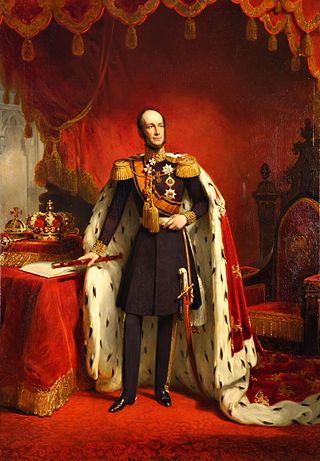
William II was King of the Netherlands, Grand Duke of Luxembourg, and Duke of Limburg.
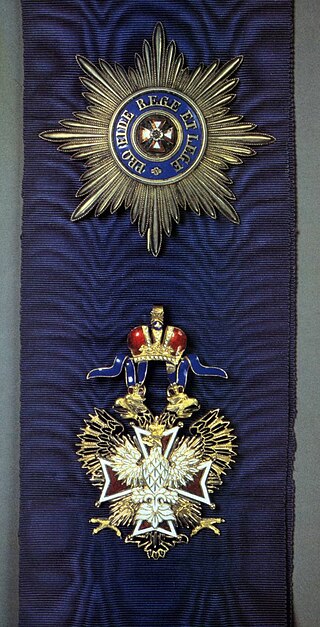
The Imperial Order of the White Eagle was an Imperial Russian Order based on the Polish honor. Emperor Nicholas I of Russia established the award in 1831 as the Imperial and Royal Order of the White Eagle. A recipient of the Order was granted the title Knight of the Imperial Order of the White Eagle.
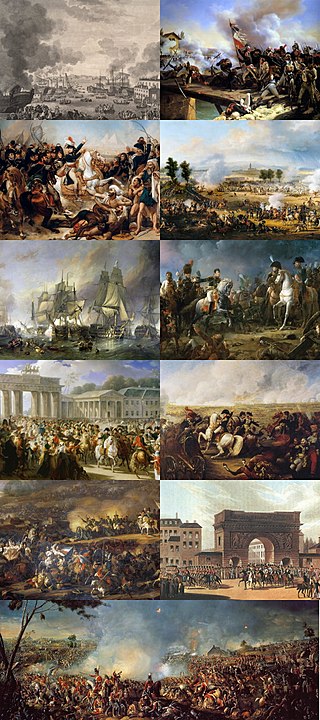
The French Revolutionary and Napoleonic Wars, sometimes called the Great French War, were a series of conflicts between the French and several European monarchies between 1792 and 1815. They encompass first the French Revolutionary Wars against the newly declared French Republic and from 1803 onwards the Napoleonic Wars against First Consul and later Emperor Napoleon Bonaparte. They include the Coalition Wars as a subset: seven wars waged by various military alliances of great European powers, known as Coalitions, against Revolutionary France – later the First French Empire – and its allies between 1792 and 1815:
![]() Media related to 1815 in Russia at Wikimedia Commons
Media related to 1815 in Russia at Wikimedia Commons